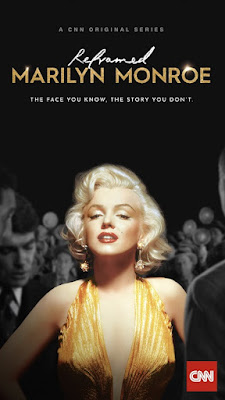Marilyn Monroe is a lot like John Wayne—stay with me here—in that they are still just about as popular now as they were at the height of their fame and they still mean exactly the same things to their fans. In Monroe’s case, that would be sex appeal first and foremost, but also music and comedy. Unfortunately, that led to a career of typecasting and underestimation for the iconic movie star. A nearly entirely female battery of commentators offers more sympathetic (and “feminist”) spins on Monroe’s life and career in the four-part Reframed: Marilyn Monroe, narrated by Jessica Chastain, which premieres Sunday on CNN.
Monroe is still a huge star, but she had to fight for everything she had, before tragically dying far too young. She grew up as an orphan, so she learned to make the best of things. While working in an airplane factory during WWII, Monroe caught the eye and lens of a photographer, who convinced her to start modeling professionally. Subsequently, she signed as a contract player at 20th Century Fox, but she was initially only cast in inconsequential parts, because studio mogul Darryl Zanuck just didn’t get her.
Obviously, she eventually caught on, with the aid of some unprecedented publicity. However, the conflict between her and Zanuck was a constant refrain throughout her career. Frankly, the best parts of Reframed explore that studio intrigue. Yet, there are probably bigger villains in Reframed than Zanuck, such as Hugh Hefner, who built his empire on her nude pictorial, but never paid her a dime for the photo shoot she had signed away all rights to.
Given her enduring stature, it is pretty amazing how short Monroe’s career was, only truly “starring” in about a dozen films. Reframed nicely covers Some Like It Hot, The Misfits, Bus Stop, and The Prince and the Showgirl (which was the subject of My Week with Marilyn), but it gives rather short shrift to Niagara and almost entirely ignores Otto Preminger’s River of No Return. There are not a lot her star-vehicles, so it is a shame to gloss over an interesting one.
On the other hand, jazz fans will be happy Reframed discusses her friendship with Ella Fitzgerald. She also gets credit for her USO tour, which cemented her appeal to her military fans. Of course, her unfortunate marriages are discussed in detail, but the treatment of Joe DiMaggio is totally unfair (recycling abuse rumors, but not crediting the Yankee Clipper for his help getting her out of the Payne Whitney psych ward). Yet, the biggest oversight in Reframed is it ignores her conversion and continuing identification with Judaism. Seriously, how did Adam Sandler overlook her for “The Hanukkah Song?” Wisely, interview subjects do their best to defuse Kennedy conspiracy rumors, especially her close friend Amy Greene.
Much of the talking heads’ analysis that emphasizes Monroe’s resourcefulness and determination rather than her victimhood is quite welcome and convincing. Unfortunately, they overuse buzz words like “patriarchy” and “agency.” Instead of discussing Monroe like they were defending a thesis at Woke U. they should have talked to the audience like fellow classic movie fans.
Regardless, it is hard to go wrong with four hours of Marilyn Monroe. Directors Grace Chapman and Karen McGann (who alternate over the course of the four episodes) pace the material well and integrate some striking private footage along with classic movie clips and truly iconic still photos. Nobody will ever match her glamor, partly because she was so in command of her image and partly because Hollywood is now so out of practice. Recommended for classic movies fans, Reframed: Marilyn Monroe starts this Sunday (1/16) on CNN, with the first two episodes “Contender” and “Siren” airing back-to-back.

